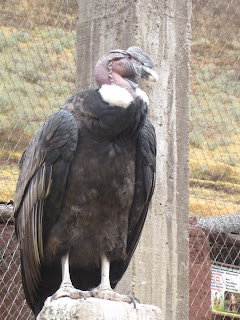 |
| Lama mother with a cross lama-alpaca baby |
The Corrao Animal Sanctuary on the way from Cusco to Pisac is free to get into and serves as a
rehabilitation centre for various indigenous species like the condor, different types of macaws and parrots and wild cats including circus rescued pumas. The animals are first rescued by the ecological police who brings them to the sanctuary. The sanctuary operates as a family enterprise and survives solely from tourist donations and purchases of animal-friendly products from their souvenir shop. The Peruvian government endorses and legalizes their paperwork, BUT offers no financial support. Tour guides DON'T stop at the sanctuary as the family who runs it cannot afford to pay the tour agency a fee for stopping there.
 Even with the government’s endorsement, it is difficult to set up an NGO due to the amount of paperwork involved. They are looking for committed support from international animal welfare NGOs. Their second purpose is educational- they have groups of school children who visit the sanctuary FREE of charge. They are asked to bring food for the animals hoping that in doing so they will learn to care for them.
Even with the government’s endorsement, it is difficult to set up an NGO due to the amount of paperwork involved. They are looking for committed support from international animal welfare NGOs. Their second purpose is educational- they have groups of school children who visit the sanctuary FREE of charge. They are asked to bring food for the animals hoping that in doing so they will learn to care for them.




As a vegetarian, I cannot recommend strongly enough this place. I think the work these dedicated people do is admirable to say the least as these animal sanctuaries could function as an alternative to zoos. Each animal has its own rescue story: most can be rehabilitated and returned the the wild; others, however are beyond rehabilitation and will spend the rest of their lives in the sanctuary supervised and taken care of by the family. Below you can see a picture of an eagle called The Master- he was bred and trained to live partially in captivity to provide a safe enviroment and to act as a model to follow for the other animals ready to be released.

As a tourist, I must admit that I went on a tour to Colca Canyon for which I had to wake up at 3m leaving Arequipa and stopping at the famous Cruz del Condor (Cross of the Condor), we saw no condors close-by.The condor, the largest bird in the in the world, is now an endangered species due to mainly bloody human practices (bulls and condors fighting in some indigenous communities), food poisoning and accidents such as having their 3 m span wings caught in electric cable. It’s simply an amazing experience to come so close to a bird so big and majestic, and such a humbling one at the same time. Animals are fascinating and wild animals even more so especially when observed close-by.
 |
| Male Condor (with crest) |
 |
| Female Condor |

 Even with the government’s endorsement, it is difficult to set up an NGO due to the amount of paperwork involved. They are looking for committed support from international animal welfare NGOs. Their second purpose is educational- they have groups of school children who visit the sanctuary FREE of charge. They are asked to bring food for the animals hoping that in doing so they will learn to care for them.
Even with the government’s endorsement, it is difficult to set up an NGO due to the amount of paperwork involved. They are looking for committed support from international animal welfare NGOs. Their second purpose is educational- they have groups of school children who visit the sanctuary FREE of charge. They are asked to bring food for the animals hoping that in doing so they will learn to care for them. 





